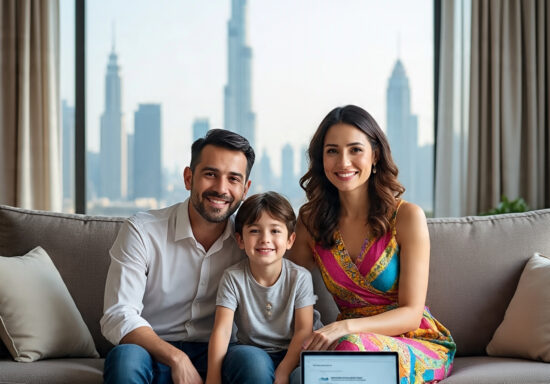Dubai is one of the most popular destinations for expatriates looking to build a better life for themselves and their families. But when it comes to living legally in the UAE, understanding the difference between a family visa and a residence visa is crucial. While these terms are often used interchangeably, they serve different purposes and apply to different categories of residents.
In this guide, we’ll clearly explain what a residence visa and a family visa are, their requirements, and how they differ, so you can make informed decisions when planning your move or bringing your loved ones to the UAE.
What is a Residence Visa in Dubai?
A residence visa in Dubai is a legal permit that allows foreign nationals to live and work in the UAE. This visa is typically sponsored by:
- An employer (employment visa)
- Your own company (investor visa)
- A university (student visa)
- A family member (in the case of family sponsorship)
Key Points:
- Valid for 2–3 years (or longer for Golden Visa holders)
- Requires a local sponsor
- Includes Emirates ID and access to services (banking, schooling, healthcare)
What is a Family Visa in Dubai?
A family visa is a type of residence visa specifically used to bring your immediate family (spouse, children, parents) to live with you in the UAE. To sponsor family members, you must already hold a valid UAE residence visa and meet certain salary and housing requirements.
Family Visa is a Subtype of Residence Visa.
Key Points:
- Sponsored by a family member already residing in the UAE
- Requires attested documents (marriage, birth certificates)
- Family members are granted residence visas tied to the sponsor’s visa validity
Main Differences Between Family Visa and Residence Visa in Dubai
| Feature | Residence Visa | Family Visa |
|---|---|---|
| Purpose | General stay and work/residency in UAE | To sponsor spouse, children, or parents |
| Sponsor | Employer, investor, or educational institute | Family member (husband, wife, parent) |
| Eligibility | Based on employment, investment, or education | Based on family relationship and income |
| Required Salary | Based on visa type (no minimum for investor) | Min AED 4,000 or AED 3,000 + accommodation |
| Validity | 2 or 3 years, renewable | Same as sponsor’s visa or limited by relationship |
| Medical Test | Required (18+ years) | Required (18+ years) |
| Documents Needed | Passport, photo, job contract or license | Marriage/birth certificates, attested documents, sponsor’s Emirates ID |
Can You Have Both?
Yes. If you are living in the UAE on an employment or investor residence visa, you can also be the sponsor for your family members under the family visa category. So essentially, you hold a residence visa, and your dependents get their residence permits under the family visa route.
Why This Difference Matters
Understanding the difference is important for:
- Visa application process
- Document requirements
- Sponsorship responsibilities
- Renewals and cancellations
For example, if you’re an employee planning to bring your family, you need to know if your salary meets the sponsorship criteria. If you’re on a family visa, you can’t sponsor others unless you switch to a primary residence visa through work or business.
Final Thoughts
In summary, while all family visas are residence visas, not all residence visas are family visas. Your path will depend on whether you’re the primary visa holder (like an employee or investor) or a dependent (spouse/child). Knowing these distinctions helps you plan better, meet UAE legal requirements, and ensure a smooth stay in Dubai.
Need help with your family or residence visa application?
Contact our expert visa consultants for fast, reliable services, including documentation, attestation, and visa processing support.






